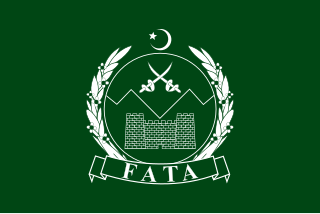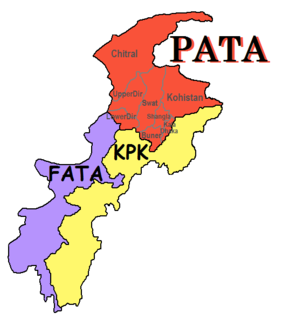
The administrative units of Pakistan comprise four provinces, one federal territory, and two disputed territories: the provinces of Punjab, Sindh, Khyber Pakhtunkhwa, and Balochistan; the Islamabad Capital Territory; and the administrative territories of Azad Jammu and Kashmir and Gilgit–Baltistan. As part of the Kashmir conflict with neighbouring India, Pakistan has also claimed sovereignty over the Indian-controlled territories of Jammu and Kashmir and Ladakh since the First Kashmir War of 1947–1948, but has never exercised administrative authority over either region. All of Pakistan's provinces and territories are subdivided into divisions, which are further subdivided into districts, and then tehsils, which are again further subdivided into union councils.
Waziristan is a mountainous region covering the former FATA agencies of North Waziristan and South Waziristan which are now districts of Khyber Pakhtunkhwa province of Pakistan. Waziristan covers some 11,585 square kilometres (4,500 sq mi). The area is populated by ethnic Pashtuns. It is named after the Wazir tribe. The language spoken in the valley is Pashto, predominantly the Waziri dialect. The region forms the southern part of Pakistan's Federally Administered Tribal Areas, which is now part of Khyber Pakhtunkhwa province. The 16th-century Pashtun revolutionary leader and warrior-poet Bayazid Pir Roshan, who wrote the oldest known book in Pashto, was based in Kaniguram, Waziristan.

North Waziristan District is a district of Khyber Pakhtunkhwa province in Pakistan. It is the northern part of Waziristan, a mountainous region of northwest Pakistan, bordering Afghanistan and covering 4,707 square kilometres (1,817 sq mi). The capital city of North Waziristan is Miranshah.
A jirga is an assembly of leaders that makes decisions by consensus according to Pashtunwali, the Pashtun social code. It is conducted in order to settle disputes among the Pashtuns, but also by members of other ethnic groups who are influenced by them in present-day Afghanistan and Pakistan.

South Waziristan District was a district in Dera Ismail Khan Division of Khyber Pakhtunkhwa before splitting in to Lower South Waziristan District and Upper South Waziristan District and the southern part of Waziristan, a mountainous region of northwest Pakistan, that covers some 11,585 km2 (4,473 mi²). Waziristan comprises the area west and southwest of Peshawar between the Tochi River to the north and the Gomal River to the south. The region was an independent tribal territory from 1893, remaining outside of British-ruled empire and Afghanistan. Tribal raiding into British-ruled territory was a constant problem for the British, requiring frequent punitive expeditions between 1860 and 1945. Troops of the British Raj coined a name for this region "Hell's Door Knocker" in recognition of the fearsome reputation of the local fighters and inhospitable terrain. The capital city of South Waziristan is Wanna. South Waziristan is divided into the three administrative subdivisions of Ladha, Sarwakai, and Wanna. These three subdivisions are further divided into eight Tehsils: Ladha, Makin, Sararogha, Sarwakai, Tiarza, Wanna, Barmal, and Toi Khula.

The Frontier Crimes Regulations (FCR) were a special set of laws of British India, and which were applicable to the Federally Administered Tribal Areas (FATA). They were enacted by in the nineteenth century and remained in effect in Pakistan until 2018. They were extended to the Gilgit Agency in Jammu and Kashmir in 1901 and to Baltistan in 1947, remaining in effect till the 1970s.

Lakki Marwat Subdivision formerly Frontier Region Lakki Marwat is a subdivision in Khyber Pakhtunkhwa province of Pakistan. The region is named after Lakki Marwat District which lies to the northeast. The region shares its boundary on the north with Bannu Subdivision, on the west with Tank Subdivision, to the west with North and South Waziristan and to the northeast with the district of Lakki Marwat. Its total area is 132 square kilometers. It is administered by the district coordination officer (DCO) of Lakki Marwat District. The main settlement in Lakki Marwat subdivision is Chichindai Kalai.

The Federally Administered Tribal Areas was a semi-autonomous tribal region in north-western Pakistan that existed from 1947 until being merged with neighbouring province Khyber Pakhtunkhwa in 2018 with the Twenty-fifth Amendment to the Constitution of Pakistan passed by the Parliament as well as Provincial Assembly of KPK. It consisted of seven tribal agencies (districts) and six Frontier Regions, and were directly governed by Pakistan's federal government through a special set of laws called the Frontier Crimes Regulations.
Administrative System of FATA was the system by which semi-autonomous tribal region of Federally Administered Tribal Areas was governed.

Bar Chamer Kand Tehsil is a subdivision located in Bajaur District, Khyber Pakhtunkhwa, Pakistan.
Barang Tehsil is a subdivision located in Bajaur District, Khyber Pakhtunkhwa, Pakistan.

Mamund Tehsil is a subdivision located in Bajaur District, Khyber Pakhtunkhwa, Pakistan. Mamund is the largest tehsil of district Bajaur.

The Twenty-fifth Amendment of the Constitution of Pakistan, officially known as the Constitution Act, 2018, was passed by the Parliament of Pakistan and the Khyber Pakhtunkhwa Assembly in May 2018. Under the amendment, the Federally Administered Tribal Areas (FATA) and Provincially Administered Tribal Areas (PATA) are to be merged with the province of Khyber Pakhtunkhwa (KP).
The Tribal Areas Rewaj Act is a bill which was introduced to the National Assembly of Pakistan and subsequently withdrawn by the government, having been met with widespread opposition. The proposed legislation called for the merger of the Federally Administered Tribal Areas (FATA) with the province of Khyber Pakhtunkhwa within five years. The act was intended to replace the Frontier Crimes Regulations (FCR) and to extend the jurisdiction of the Supreme Court of Pakistan and the Peshawar High Court over FATA.
The Constitution Act, 2017 was a proposed amendment to the Constitution of Pakistan seeking to create seats for the Federally Administered Tribal Areas in the Khyber Pakhtunkhwa Assembly and establish a new judicial system in the tribal belt. The amendment would have added new provisions to the Constitution to create room for FATA lawmakers in the Khyber Pakhtunkhwa Assembly after the merger of FATA and Khyber Pakhtunkhwa. The amendment was introduced to the National Assembly of Pakistan alongside the Tribal Areas Rewaj Act.
The Pakistan Levies, also called the Federal Levies, are paramilitary law enforcement organizations (gendarmerie) in Pakistan that have a primary mission of providing law enforcement, providing assistance to the police in maintaining law and order, and conducting internal security operations below the federal level. Pakistan Levies is an umbrella term for the various Levies Forces which operate under their own separate chains of command and wear distinct patches and badging.

Dosso v. Federation of Pakistan was the first constitutional case after the promulgation of Constitution of Pakistan of 1956 and an important case in Pakistan's political history. The case got prominence as it indirectly questioned the first martial law imposed by President Iskander Mirza in 1958.
On 31 May 2018, with the application of 25th Amendment, Federally Administrated Tribal Areas ceased to exist, and stood merged into neighbouring province of Khyber Pakhtunkhwa.

Shoukat Aziz is a Pakistani human rights activist known for abolishing the Frontier Crimes Regulation and co-founding the youth rights group FATA Youth Organization (FYO). He advocates for students' rights, human rights, and minority tribal rights, with a particular emphasis on the rights of those living in the Federally Administrated Tribal Areas (FATA) of Pakistan. He was responsible for abolishing the Frontier Crimes Regulation, a group of laws which had long been denounced by international human rights activists.











